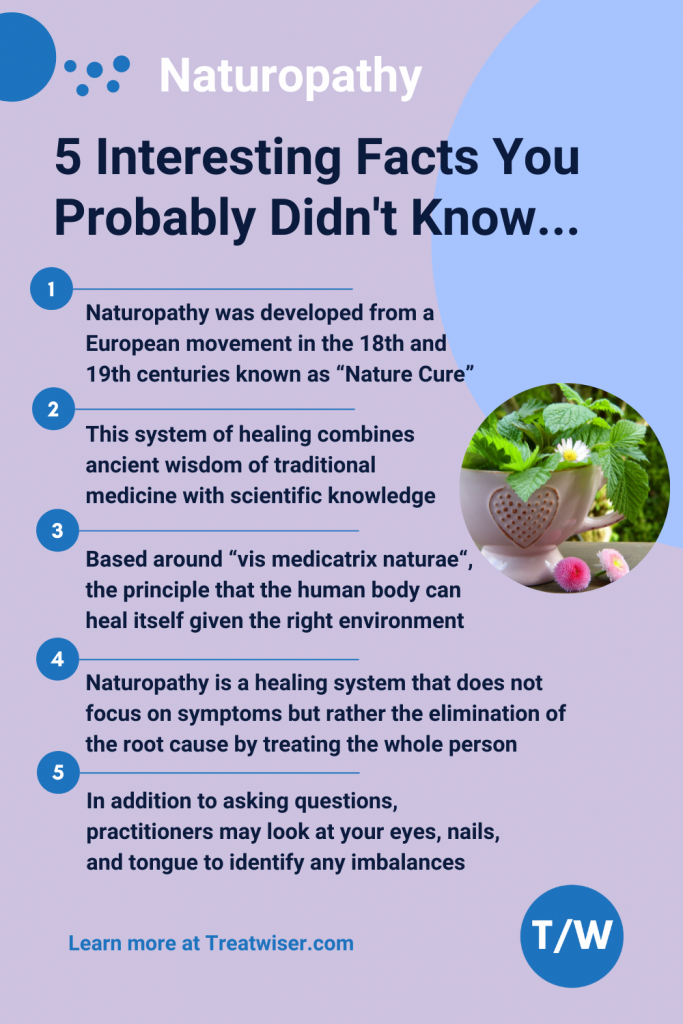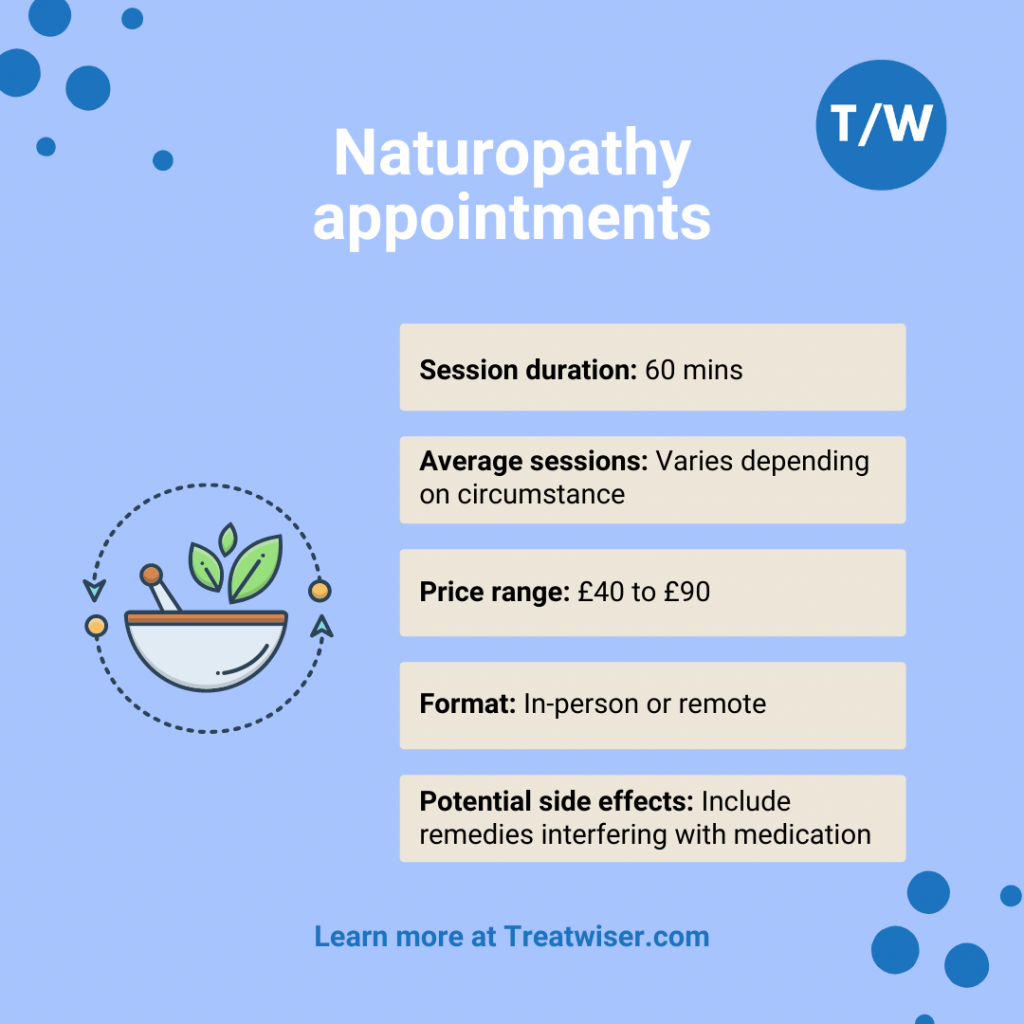Do you feel like conventional medical doctors are too quick to prescribe medication without exploring the cause of your symptoms? If so, naturopathy therapy may interest you.
This centuries-old system of healing combines the ancient wisdom of traditional medicine with scientific knowledge – and has grown in popularity in the UK since the 1970s. In this article, we’ll tell you more about naturopathy and how you can find a qualified naturopath.
Table of contents
- 5 interesting facts about naturopathy
- What is naturopathy?
- What is the theory behind naturopathy?
- When and how is naturopathy used?
- What is the evidence to support naturopathy?
- What can I expect as a naturopathy patient?
5 interesting facts about naturopathy

What is naturopathy?
Naturopathy is a holistic and integrative medical approach that aims to restore balance to the body and mind. A practitioner of naturopathy – known as a naturopath or a Doctor of Naturopathic Medicine (ND) – uses natural remedies, lifestyle changes, and non-invasive therapies to support the body’s innate healing ability.
NDs look for the underlying cause of symptoms by taking the patient’s genetics, medical history, lifestyle, diet, emotional state, work situation, and life stress into account.
Naturopathy has 300 years of history
Modern naturopathy was developed from a European movement in the 18th and 19th centuries known as “Nature Cure.” Although some of its practices have been used for centuries, drawing upon a rich heritage of writings and practices of Western and Eastern natural doctors since the time of Hippocrates. Its underlying philosophy and belief are that the body has the innate wisdom to resist disease and the mechanisms to be able to self-regulate and recover from disease. It believed in nutrition, fasting, rest, hydrotherapy, fresh air, and sunshine to enhance healing. There are numerous amazing practitioners who influenced naturopathic medicine, however, a German doctor named Benedict Lust is known as the father of modern-day naturopathy. He was responsible for bringing this practice to America and founding the American School of Naturopathy, later known as the American Naturopathic Association in the early 1900s.
Due to the invention of antibiotics and the rapid developments in allopathic medicine, naturopathy lost popularity after the 1930s. Nowadays, with the rise in public awareness about natural approaches to health and wellness, this holistic practice is experiencing an exciting resurgence.
What is the theory behind naturopathy?
Naturopathy is based on the healing power of nature, and how it supports and stimulates the body’s ability to heal itself. Naturopaths view mental and physical symptoms as a sign that the body is attempting to heal. They also believe all body systems are connected – for example, an imbalance in digestive function may manifest as a skin condition. It’s the job of the naturopath to identify imbalances and facilitate healing!
Naturopathy follows 6 principles
Hippocrates, the father of modern medicine, developed the 6 principles of healing that have been adopted by naturopathy to guide therapists / practitioners (1).
- Do no harm: NDs use a natural, gentle, and non-invasive approach to healing that doesn’t cause harm or suppress symptoms.
- The healing power of nature: Naturopathy is based around “vis medicatrix naturae“, which means the human body can heal itself given the right environment.
- Treat the cause: This system does not focus on symptoms but seeks to eliminate the root cause.
- Treat the whole person: All aspects of each person’s mental, physical, and emotional health are considered during treatment.
- The Naturopath is a teacher: Each consultation focuses on educating the patient around how to take control of their health with lifestyle changes.
- Prevention is better than cure: NDs identify potential risk factors in the patient’s genetics, lifestyle, and environment to prevent health problems before they begin.
When and how is naturopathy therapy applied?
Whether you have acute or chronic symptoms or just want to prevent disease, Naturopathy is safe for people of all ages and can be used alongside allopathic medicine. However, it’s not a quick-fix therapy and requires the patient to be actively involved in their healing.
Naturopathy is used to improve general health and well-being
People commonly seek out naturopathy for the following reasons, however more research is required to support its efficacy, and you should always speak to your GP or qualified medical practitioner before booking any appointments:
- Chronic pain
- Chronic fatigue syndrome
- Fibromyalgia
- Musculoskeletal conditions
- Low immunity
- Hormonal imbalances
- Thyroid disorders
- Women’s health
- Allergies
- Skin conditions
- Cardiovascular disease
- Headaches
- Digestive conditions
- Anxiety and low mood
- Fertility
Naturopathy is also used by people with no health problems to enhance their current level of health and prevent disease.
Naturopathy uses a range of treatments and techniques
The foundations of naturopathic medicine are proper nutrition, sleep hygiene, movement, supplements, and herbal remedies. Naturopaths are also trained in various therapies and techniques to facilitate healing, including:
- Herbal medicine
- Elimination diets
- Detoxification protocols
- Dietary supplements
- Iridology
- Homeopathy
- Tissue salts
- Flower essences
- Reflexology
- Acupressure massage
- Hydrotherapy
- Aromatherapy
- IV Therapies
- Chelation therapy
- Colon Hydrotherapy
- Hair analysis
- Light therapy
Keep in mind that treatments are unique to each patient.
What is the evidence to support naturopathy?
A promising 2019 systematic review published in the Journal of Alternative and Complementary Medicine found that naturopathic medicine may help in a range of complex situations. This includes cardiovascular disease, musculoskeletal pain, type-2 diabetes, polycystic ovary syndrome, depression, and anxiety (2).
What can I expect as a naturopathy patient?
During treatment, your naturopath will address any system or organ weakness through lifestyle changes and natural therapies. In doing so, they may reduce inflammation, promote healthy detoxification, strengthen the immune system, and boost overall metabolic function.
The naturopathic appointment
At the initial naturopathy appointment, your therapist / practitioner will spend 1-2 hours discussing your medical history and creating a treatment plan. They will ask you about your symptoms, stress levels, diet and lifestyle habits – taking into account your mental and emotional state. They’ll look at your eyes, nails, and tongue to identify any nutritional deficiencies or imbalances. They may also go through your past blood tests and send you for further testing if necessary.
Your naturopath will then discuss a treatment plan with you that addresses both mind and body wellness with the help of natural remedies, complementary therapies, diet and lifestyle changes. Everything will be explained, and the therapist / practitioner will only move forward with your consent.

How do I find a naturopath and what qualifications should they have?
Naturopathy is not currently regulated by law in the UK. However, there are voluntary bodies that aim to ensure practising naturopaths have the proper training and abide by professional standards.
A qualified naturopath, or naturopathic doctor, should have completed a diploma or degree accredited by the General Council and Register of Naturopaths (GCRN). We recommend finding a therapist / practitioner who is registered with the GCRN, the General Naturopathic Council, or the British Naturopathic Association.
You can also use Treatwiser’s directory to find a naturopath near me. Use the search features to narrow your search by location (e.g., find naturopathy near me in London), professional body membership status, and more.
How much will it cost?
Naturopathy therapy is not covered on the NHS and you will need to pay for it privately. In the UK, an appointment ranges in price from £40 to £90 per hour, with the initial consultation costing more. There may be extra costs for any functional testing, health supplements, or herbal remedies.
Please discuss the potential cost with the therapist / practitioner before beginning treatment.
How many appointments will I need?
The number of naturopathic appointments you need is dependent on your circumstances; your therapist / practitioner will discuss this with you at the initial consultation. Some people will benefit from just a few appointments, while others need long-term treatment to see improvements.
What are the risks associated with naturopathic treatments?
Naturopathy is a low-risk holistic therapy when administered by a well-trained therapist / practitioner. However, it is important to understand the limitations of the treatment and not to refuse advice from your primary care doctor in favour of naturopathy.
In some cases, remedies prescribed by naturopaths may interact with certain medications. Speak to your doctor before starting any naturopathic treatments.
What do patients and therapists say about naturopathy
Read some testimonials to hear what patients and therapists are saying about their hypnotherapy experiences:
Resources and further naturopathic information
- https://www.ncbi.nlm.nih.gov/pmc/articles/PMC2883816/
- https://www.ncbi.nlm.nih.gov/pmc/articles/PMC6389764/
- https://www.gcrn.org.uk/
DISCLAIMER: The Site cannot and does not contain medical / health advice. The medical / health information is provided for general informational and educational purposes only and is not a substitute for professional advice. Accordingly, before seeking any form of medical advice, diagnoses or treatment based upon such information, we encourage you to consult with your GP or other qualified health practitioner. You must never disregard professional medical advice or delay in seeking it because of something mentioned on this Site. The use or reliance of any information contained on the site is solely at your own risk.





